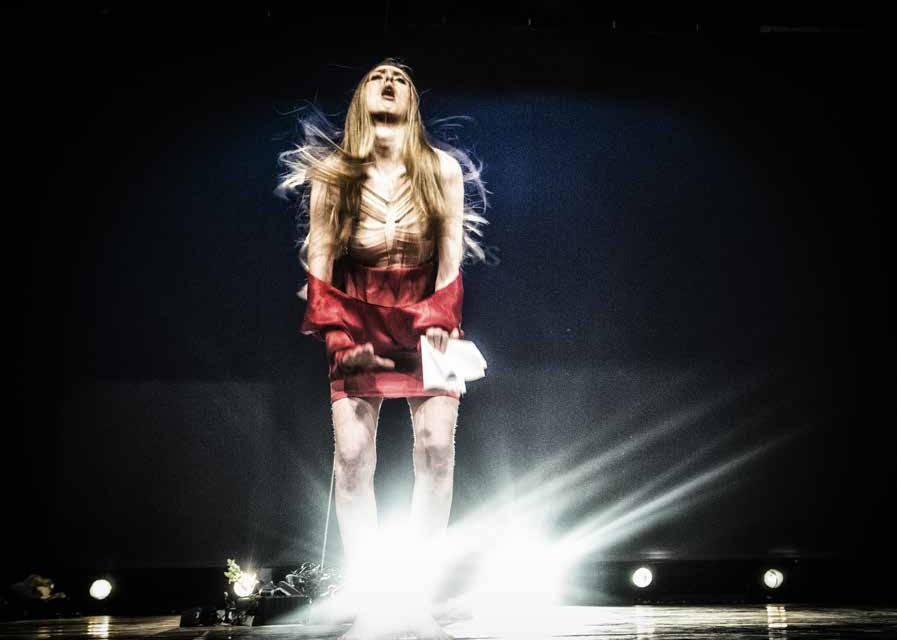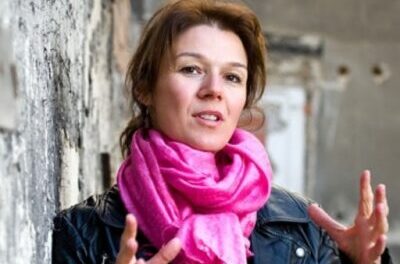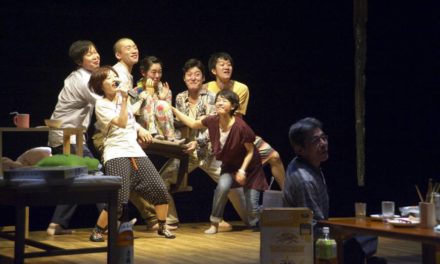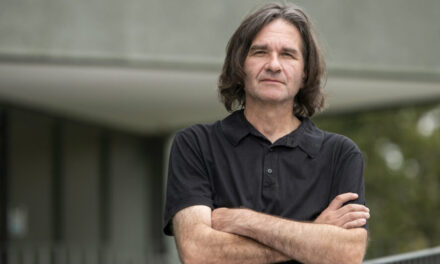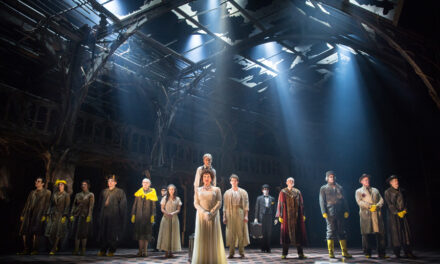What were the beginnings of your work with the Garbaczewski & Cecko duo? You met while working on The Sexual Life of Savages?
Right. Mateusz Kościukiewicz was supposed to act in the play. When he called me, the cast was almost complete. Nonetheless, he arranged a meeting with Krzysztof. I was sitting in on the rehearsals, and only later was I invited to take part. That was an interesting experience. I had never worked like that before – to make a space and not “make a play.” The Sexual Life Of Savages was madness, we got a rehearsal space, our “gray zone,” on Puławska Street. That’s where we shot and watched films and made music. It was a time of total freedom. A commune of marvelous people was created – they came there “after hours,” sat around, read, exchanged ideas, sang, and danced.
And how was it with Balladyna? Were you invited to play the main role at once?
Yes. I participated in this process from the beginning. It was not as though the rehearsals ended and we could forget about it. We were immersed in it the whole time. Of course, to a large extent, I was just sitting in.
What was your response after reading Marcin Cecko’s script?
The text appeared fairly late. The second part really came to be when rehearsals were already underway. The final version discards half of the original text of the script we were working on. After Part Two, the text came about only four days before the premiere, affected by our performance gesture of rebelling against a certain structure. But you asked about my response after reading the text. I really admire Marcin’s writing, how it builds significance, his poetic style, so from the outset it was an interesting read, with lots of blank spots. And blank spots are what I like the best. I know that the text, the material we get as actors, is never the final word, but rather something we can keep rebuilding and using to search for new meaning. This is what is so remarkable in working with Krzysztof and Marcin. At the same time, this is a risky business, resulting from the fact that everything is constantly in flux.
Did you know off the bat that you would have two roles – Goplana as well?
No, absolutely not. But at one stage of work, it turned out that Goplana was the personification of nature, the flip side of Balladyna and her potential for fulfillment. We can test, modify, and harness nature, but ultimately it controls us. Goplana is a reference to this elemental and incontestable strength.
You said that the script was developed during rehearsals? Did it recall “writing on the stage?”
There are directors who work that way. But in Marcin’s case, it works differently. The script is created independently, but while working on the play we discover new spaces and we build certain things along the way. Marcin is open to this. We talk and try to reach certain compromises.
What was the process of working together like?
We spent a long time wondering what regions we wanted to access with the figure of Balladyna. Ultimately we drew from Julia Kristeva’s Black Sun, from the phenomenon of depression as complete exhaustion. What is it, where does it come from, and what are the consequences of depression? Then we went on to Clarissa Pinkola Estés’s Women Who Run With The Wolves. We spoke of the archetype of the primordial woman. These were the main themes, and they remained present. In spite of her depression, Balladyna begins to feel something through the murders, as a result of which she gains everything – Kirkor, the theater – but she has absolutely no idea what to do with it. The script had scenes of “palace life” with Kirkor and without Kirkor, who was always away on business. New characters appeared – Asia and Kasia – who were meant to help Balladyna pass the time and to teach her to find the woman in herself. That was meant to be a process that would lead to making Balladyna independent, but it didn’t work – we didn’t want to do that kind of theater. It suddenly turned out that the second part was an incredible, fictional tale.
Five days before the premiere we really brainstormed, convinced that it needed changing, going to the next level. And the second part came about from private conversations. At night, while I was asleep, Marcin shut himself up in his room, dressed in my things, took out his tablet and began recording himself – he was trying to be me. To think my thoughts. I only got scraps, attempts, fragments of his nighttime performance. When you work with someone you’ve known for a long time, you really can read each other’s thoughts.
During your monologue you ironically say that women speak the words of Coetzee and Słowacki, and yet you yourself are speaking words a man wrote for you.
Balladyna rejects the male narrative of women, rebelling against words that come from men, and yet she does not speak her own words. Marcin created the figure of Balladyna, who rebels against this structure, she frees himself from it. But it’s true that this is still his perspective, his imagination. My task is to render it in terms of my personal relationship to his imagination. Balladyna written by Marcin is plucky and bold. I give her my doubts, weakness, and fear.
So this is a “text for improvisation?”
Yes, a text for improvisation that I don’t always take advantage of.
Is this how you break out of the patriarchal discourse?
The very attempt to struggle with this discourse is valuable. And the result? Well, I’m working on it. Balladyna’s inability to make a bold statement is, to a large degree, my own.
Is that why you asked the girls from cipedrapskuad to sing something?
They have the courage and a remarkable sense of humor. It’s fascinating because both of them are primarily artists, performers, and only then rappers. In the context of their work and how they operate in the field of art, their performance has a broader meaning. But as they say themselves, they are more interested in “pure” reception, without the context of their previous work.
In the second part, it is hard to separate the character of Balladyna from the actress and from you yourself.
Those boundaries are fluid. Balladyna/I/the actress (always understood in those three configurations simultaneously) is dressed in cliches and constructed of stereotypes. She suddenly comes to the theater/palace, kills (or pretends she kills) Kirkor, and can speak to the people, whom she inherits, as it were. This Balladyna reveals the phenomenon of the murderess who, owing to her crime, can speak. She does not have her own voice, she wants to stop speaking in a male language, even if she sacrifices some content along the way. Balladyna is both trying to expose herself, to compromise herself in her confidence in speaking that she has nothing to say, and to expand the “here and now” with her body, her cunt, her sadness. And now: which is which?
This is why I suggested the definition “a text for improvisation,” because this is a text you change by yourself. This is your female gesture, not only as an actress but also as a private person – an attempt to break free of the patriarchal discourse.
Yes, it really was such an attempt. I don’t know which performance you attended, but a lot depends on the state I am in, how I’m feeling. How much strength I have. All that affects how things work out. When I break through Marcin’s text and I enter “my own zone,” I sometimes catch myself basically speaking about me. Because what does it mean to go in front of people and start telling them about women, about yourself, from the heart? Here and now, in a prearranged theatrical situation.
It’s very strange. When you break through that structure and start following your own stream it suddenly turns out that it’s not yours at all. I catch myself saying words that paraphrase, for example, some lines from Kafka or something that has etched itself strongly in my head.
And again you mention a male writer…
Of course, I should have said Virginia Woolf – scratch that!
What else is part of that canon? What helped you construct the role?
I almost thought you said “castrate the role” – and that would be a very apt phrase. But getting back to the canon, you want a list? It was a process: conversations, reading, and endless discussions.
I hesitated because with your role it is hard to speak of “constructing the role” (or rather roles) of Balladyna. I wonder what criteria we can use to describe the tension between the stage presence of Balladyna and your physical presence. Your acting constantly crosses those borders.
I associate construction with screws, spans, bridges, blueprints, parts that ideally fit together. There are no blueprints here, nor a place we hope to get to on the opposite side. I myself wonder how to speak of this sort of process. It is not building a character based on some kind of equation – creating something that is meant to generate a defined effect. It takes place from the other side, this effect is the product of establishing the capabilities of inhabiting, delving into, and expanding boundaries. I don’t build anything according to a plan. This might be a problem, maybe I should construct, but wouldn’t that be the end of the journey? It’s a mystery to me.
Tell us something about your interaction with the audience. In the first part, when you mainly play to the camera and this contact is mediated, the viewers are still constantly present, you speak to them directly.
To my mind, the viewer in Part One works like a “black sun.” Black strength is hidden in a lake, Goplana, who suddenly begins taking control of my character. When Balladyna turns to face the camera it is as though she stares into her own warped, dark reflection.
How do Poznań audiences respond to the second part, then? When you step out onto the stage as Balladyna-Wasilewska and call the Polski Theater a cunt/candy box. Then you ask the viewers sitting in the first balcony to imagine they’re the Kegel muscles and they begin to exercise – getting up and sitting down. What happens? Do you sometimes convince them to do it?
They always stand up. Almost always.
At the performance, I attended they didn’t stand, and some people walked out.
It happens, but generally, they do stand up. You asked how they respond. Often with distance and a sense of humor, but sometimes we get a nervous laughter as if they were embarrassed for me. There were a few times when I saw from people’s faces that they were shocked and put off when I said the word “cunt.” As if they had heard it for the first time. The word “cunt” is beautiful, after all. It is also an important part of the female body, which is why we oughtn’t to fear the word. When I hear that this gesture is scandalous and vulgar, I wonder all over again what we mean when we say “scandal.” Maybe my very presence is so vulgar and scandalous, but that would be simply too flattering.
Are you staging an attack on the temple of art?
I would like to. Art should rebel and overthrow its temples.
You mix serious themes with gags, with funny scenes. Kostryn carries a soccer ball under his shirt to look pregnant, while you reject the right to give birth and ask for the man to “take the birth upon himself.” Who are you mocking?
We’re playing: house, field, playing “Poland,” playing girls and boys. A game according to set rules, and one that ends with a shot in the back of the head. We do it ourselves. Who are we laughing at? At ourselves.
Your feminist/patriotic discourse is thus less than serious. Most feminists would take exception to your ironic slogans.
I hope so because it’s often discord we’re after. It is hard for me, as an actress, to speak of the repercussions of the play and of what feminists might have to say about it. I’m in it. To my mind, the whole feminist/patriotic discourse of the second part is a tale of powerlessness.
Of your powerlessness as a woman?
You’re born a woman in this country, not anywhere else, and you get all this cultural baggage. And with it, you set off on your journey through life. We’re molded from a patriarchal, Christian clay, you can’t just wash it off. Or maybe only methodically – slowly, step by step. I have a powerlessness in me that I try to struggle with. To reconstruct myself, not as a Pole, or a woman, but a person. To stop the voices that are speaking through me in replicated words, strange gestures revealing my feminine weakness, gestures that I keep making. On the one hand, I long for a constant struggle for myself, and on the other, there is the awareness of inevitably losing in a country where some are more equal than others…. In one of my favorite films by [Wojciech] Has, How to Be Loved, the main protagonist says: “everything that happens to us we initially call life, and only after some time it turns out to be our country.” It always strikes me: however far you flee, however much you delude yourself – it always gets you. Is there a choice of freeing yourself from your past, your nationality, your identity? And is it really a question of freedom? Maybe it’s more of an attempt to know, to love, and then to reject. Just as in life. The meaning of my search is in struggling with my own inability, my weakness. Balladyna receives a present in the form of the theater, it is her only chance to speak, but it turns out she has nothing to say. Would it change anything if she did have something to say? I am not someone who is actively involved in feminist and class politics. For now, those subjects interest me only on an intellectual level. I’m at the stage of fighting for myself – for finding out the position for starting a struggle for something.
Based on what you’re saying, you can’t hope to carry out any kind of positive program, to break through the linguistic and cultural oppression. Does this mean your play is not a disaster, in neither an aesthetic nor an ideological sense?
I don’t know how to tell you what this play is about or what effect it creates, but I do wonder what an ideological victory would mean, what it would be. I would be more prone to say that this is my private fiasco than to make judgments on the play as a whole.
What do you have in mind when you say your “private fiasco”?
I have tentatively called my space of activity an “expansion of the field of disgrace” – of positive disgrace, on many levels. The moment I go out on stage with the tools I have – text, body, costume, theater – is a trial for me, which ends unfulfilled. When I go out to the people I have a great need to give them something. Simple as that. To fill them up with something. I know it will never happen the way I’d want it to. That’s why I call it a fiasco.
And what do you wrestle with as an actress?
I constantly wrestle with myself, with my body, my voice. I try to put myself to the test, to find my strengths. I’ve got chaos and uncertainty inside of me, so I look for certainty and structure that won’t simultaneously turn into convention or emulation. I learn courage. When I was growing up I practically didn’t speak at all, I mean, I didn’t express myself. I had problems with articulation even in terms of physical speech, I had a nasal voice, I didn’t enunciate. I didn’t know how to express myself at school, from the start until the finish. I was afraid that people could get impatient and not hear me out until the end, because I would be incomprehensible. This is my stigma. When I went to a speech therapist, she told me that I would never become an actress because I had a cleft palate. She advised me to find other pastimes and interests. I began working on it. I later brought her my recordings, in which I sang to accompaniment. After listening she said it was impossible that I spoke in such a way with my defect, let alone sang. It turned out my need to speak was so enormous that I found another pressure point for the sound. I put my tongue somewhere else, and I use a lot more strength to make my voice come out. It turns out you can still make a change even when you start at a disadvantage. But it’s a slow, gradual process. In my case there was an inner-revolution, but not without its consequences, because in fact, I am still afraid to speak. I am always learning to construct my ideas in my voice from start to finish. Often when I’m speaking a monitor will switch on: “Oh God, he’s not listening anymore.” I have to constantly keep my trauma in check. That disrupts the process of thinking further: I lose myself in my thoughts because I go to another level.
A metalinguistic one.
Exactly. And I lose touch with what I say. For me a conversation with another person is a challenge, to say nothing of a public statement. This is why I became an actress, to speak under a flag. On the stage, I’m someone different, and as someone different, I can speak, because as myself I would not have the courage. I don’t have the ability to divide myself, as you can hear yourself. And now this conversation has become a meeting with a psychoanalyst.
And you were resistant to the idea that the second part of Balladyna would be built around your improvisation?
No, I thought right away that this was an interesting concept. I’m not afraid of such challenges, I adore them, and yet I’m afraid every time I go onto the stage. I know, I’m contradicting myself, that’s how it is. This part is a challenge – strange, difficult, but exciting. I like pushing the sphere of humiliation. I humiliate myself completely so that I can move on.
I remember a phrase from a review of one of your previous plays. It spoke of the “acting of a very young, girlish actress.” It would be hard to say something like that about you after the premiere of Balladyna.
But I am very young and girlish! Terribly!
This article was originally published in Didaskalia in 2015 and has been reposted with permission.
This post was written by the author in their personal capacity.The opinions expressed in this article are the author’s own and do not reflect the view of The Theatre Times, their staff or collaborators.
This post was written by Justyna Wasilewska.
The views expressed here belong to the author and do not necessarily reflect our views and opinions.

